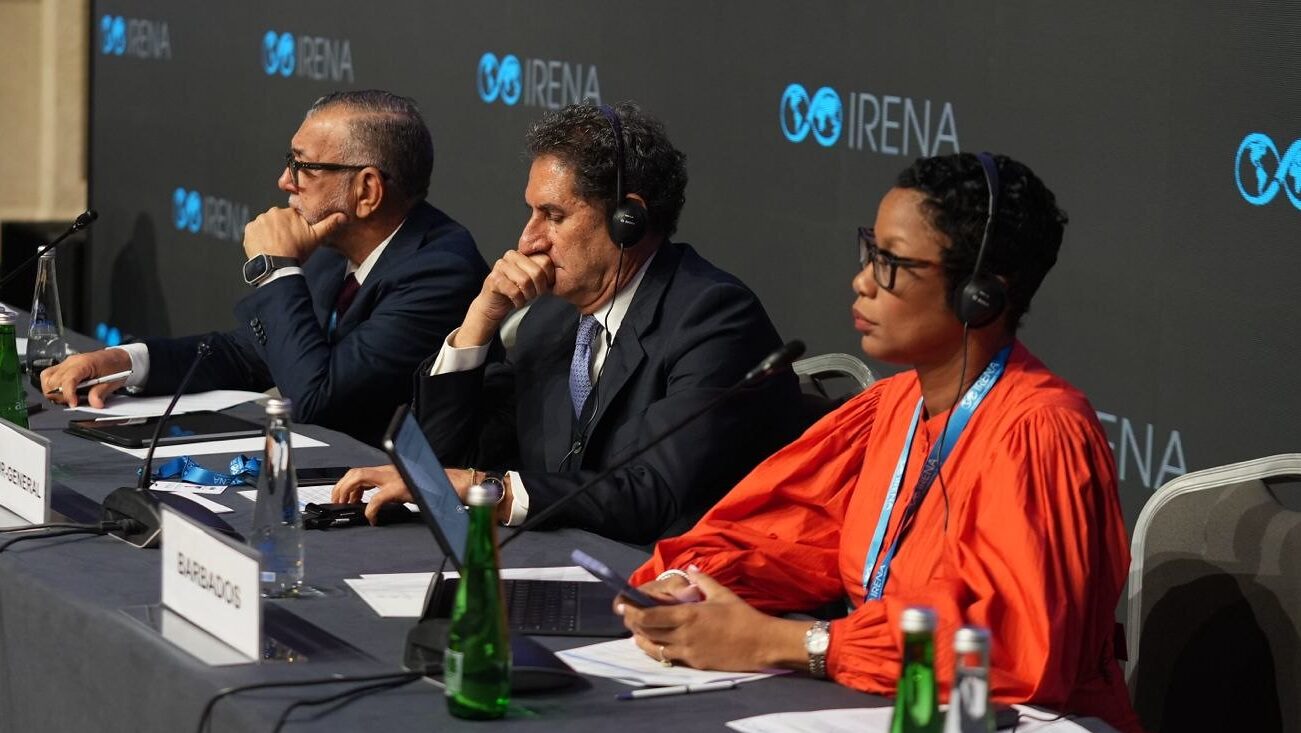Minister Lisa Cummins Urges Small Island Developing States to Champion Energy Transition and Climate Action

April 17, 2024
Minister of Energy and Business Development Senator Lisa Cummins emphasizes the importance of small island developing states uniting for energy transition and climate action during SIDS Ministerial Meeting at IRENA Assembly.
Minister of Energy and Business Development Senator Lisa Cummins has urged small island developing states (SIDS), including Barbados’ Caribbean neighbours, to use their collective voices to champion energy transition and climate action.
Even though SIDS are varied and diverse in their global distribution and cultures, economic and political structures, languages and as many parameters as can be used to assess and categorise, she said, the challenges they face are similar.
Cummins was addressing the SIDS Ministerial, Charting a Resilient and Sustainable Energy Future for SIDS, on Tuesday, on the sidelines of the 14th Session of the International Renewable Energy Agency (IRENA) Assembly in Abu Dhabi.
“Our small sizes and limited resource bases coupled with high dependencies on foreign trade result in our susceptibility to external economic shocks and natural hazards. As a result, the high debt-to-GDP ratios classify us as high-risk territories which translates to a high cost of capital – a key barrier to attracting investments,” she said.
Cummins said that partnering with international entities and investors can lower debt financing and that such relationships are crucial for funding renewable energy projects and their associated infrastructure.
“However,” she said, “access to long term investments is critical, and financing is a complex issue that requires a revolutionary approach for SIDS.”
According to Cummins, SIDS have made progress even amid the challenges of energy security and affordable energy services, as well as adaptation and mitigation to climate change.
“Despite the challenges of COVID, despite the high debt-to-GDP ratio, and despite natural disasters which we are exposed to annually, we have collectively doubled our renewable energy capacity over the last 10 years,” she stressed.
The energy minister said SIDS’ commitment to accelerating their energy transitions have been heavily focused on the electricity sector but resilience and sustainable development demand that they agitate for the decarbonisation of the transportation and other end-use sectors.
SIDS, she said, cannot rely on “the same systems and methodologies if we are to chart a resilient and sustainable energy future for SIDS,” adding that new paradigms and innovative solutions are required “or we will reach so far and no further”.
Cummins noted that 30 years after the first global conference on sustainable development held in Barbados in 1994, the SIDS Lighthouses Initiative (LHI) – a framework for action to support SIDS in their energy transition efforts from fossil fuel dependence to renewables – “has been a significant advancement of that bold declaration”.
“Over the past 10 years, the success of this initiative speaks for itself: the 2020 target of mobilising US$500 million, deploying 100 megawatts of new solar photovoltaic capacity, 20 MW of new wind power, significant quantities of small hydropower and geothermal energy, and requiring all SIDS to develop renewable energy roadmaps, as well as the 2023 target of 5 GW of installed renewable energy capacity were both achieved ahead of time.”
However, she warned that this is not a time for “nostalgia” or “to rest on our laurels”.
”It is a time to reaffirm our commitment and reassess our strategies, for much remains to be done. The global stocktake calls for a tripling of renewable energy capacity and a doubling of energy efficiency by 2030,” she said.
Quoting the theme of the two-day assembly which begins on Wednesday, Outcome of COP28: Infrastructure, Policies and Skills for Tripling Renewables and Accelerating the Energy Transition, Cummins said this will be SIDS’ focus over the next two days.
She said that targeted solutions, comprising modern flexible policy, regulatory and legislative systems which are responsive to technological advancements as well as bespoke financial models are a necessity.
“Technical assistance, knowledge transfer and capacity building of our human resources need to be the nucleus of the transformation. The continuous development of these systems is vital to facilitate SIDS’ access to appropriate financing for the implementation of renewable energy projects,” Minister Cummins said.
She said this would assist SIDS in better managing their high debt profiles and channel investments to modernising archaic infrastructure, to facilitate the onboarding of renewable energy and innovative solutions such as storage onto electricity grids without compromising stability and reliability.
(CMC/BT)


